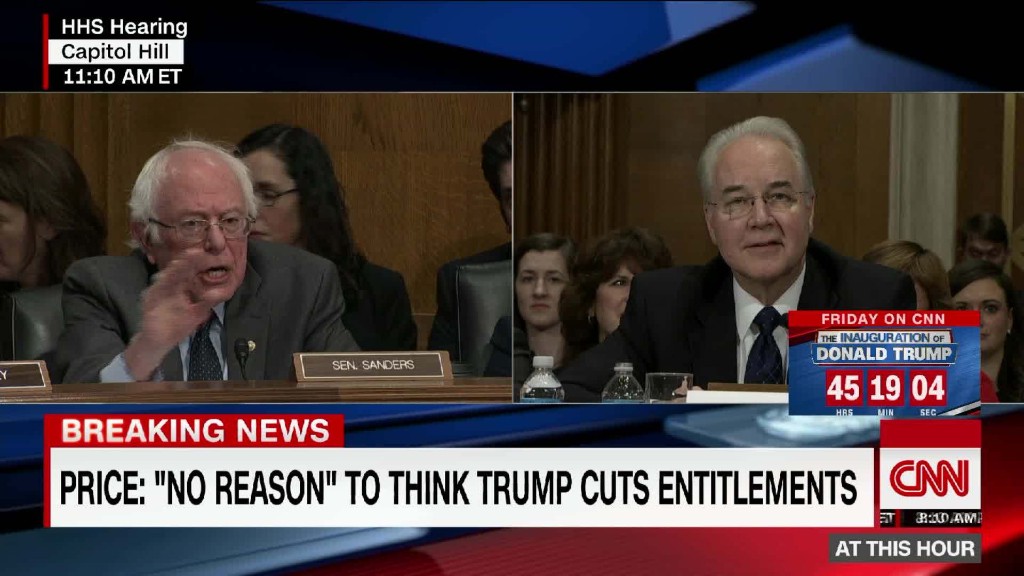
In a nearly four-hour grilling Wednesday, Donald Trump's nominee for health secretary told senators again and again that he doesn't want anyone to lose health insurance.
Tom Price didn't quite say "If you like your health care plan, you can keep your health care plan" -- President Obama's famous words that came back to bite him. But he did acknowledge at the Senate Health Committee hearing that it's "imperative" for people to maintain their coverage.
"Nobody's interested in pulling the rug out from under anybody. We believe that it's absolutely imperative that individuals that have health care be able to keep health coverage and move hopefully to greater choices and opportunities for them to gain the kind of coverage that they want for themselves and their families," Price responded, after being asked whether Obamacare's repeal would take effect only after an alternative is put in place.
"There's been a lot of talk about individuals losing health coverage," he continued. "That is not our goal, nor is it our desire, nor is it our plan."
Related: Why it's so hard to replace Obamacare
The Georgia Congressman emphasized repeatedly that consumers would have access to more affordable coverage, but he did not reveal any details about Trump's plan to replace Obamacare.
The President-elect told the Washington Post Sunday that he had a replacement plan that was nearly done and that its goal was to provide "insurance for everybody." Vice President-elect Mike Pence reiterated to CNN's Dana Bash Wednesday that Trump is "very close" to releasing his plan, though he believed Trump's pledge is really about "making insurance affordable for everyone."
But many GOP leaders said they are not aware of the plan, and they backed away from Trump's seeming promise to cover everyone.
Republicans lawmakers also have shied away from questions about how many people would be insured under their plan versus Obamacare, which has extended coverage to 20 million Americans. Instead, they say their overhaul would provide so-called "universal access," rather than "universal coverage."
Related: Here's the plan Trump's health secretary pick doesn't want to discuss
Senator Bernie Sanders was among the senators who took issue with what "access" means.
"Has 'access to' does not mean that they are guaranteed health care," said the Vermont senator, who backed even greater government intervention in health care in his presidential campaign last year. "I have access to buying a $10 million home. I don't have the money to do that."
At the hearing, GOP members painted Obamacare as a costly and collapsing law that was doing more to hurt Americans than help them receive affordable, quality coverage. Price repeatedly promised that his plan would offer consumers more options with lower prices and would put them back in control of their health care.
Democrats, meanwhile, extolled President Obama's landmark health reform law as providing more comprehensive coverage to millions of Americans. They questioned the nominee about whether he'd keep the popular provisions of the law, such as requiring insurers to cover children under age 26 on their parents' plan.
Price batted away those concerns, saying the administration was willing to work with lawmakers to craft a plan that addresses those issues.
He even went further, saying he's looking to extend coverage to the 20 million people who are uninsured, adding Obamacare has made it "virtually impossible" for them to gain coverage. (There were 28.4 million uninsured Americans in the first half of 2016, according to the latest Centers for Disease Control and Prevention data.)
Related: Mike Pence: Trump 'getting very close' to Obamacare replacement
Maine Senator Susan Collins asked Price whether his goal is actually to have more people covered by insurance. Price answered "Yes."
Though Price has authored one of the most detailed replacement plans in Congress, he did not discuss it in depth in Wednesday's hearing. However, his responses did provide insights into what his priorities would be as health secretary, which are in line with typical Republican orthodoxy.
He listed his six guiding principles as: affordability, accessibility, quality, choice, innovation and responsiveness.
When Democrats attacked him for wanting to jettison the array of benefits mandated by Obamacare -- such as eliminating lifetime caps on insurers' payouts and providing substance abuse and mental health coverage, Price said consumers should be free to choose whether they want those benefits.
"What I am absolutely committed to is making certain that every single American has access to the kind of coverage that they want and has the financial feasibility to be able to purchase that coverage," he responded.
Related: Under fire, HHS nominee Tom Price says Financial dealings were legal
Price agreed with Republican governors that states should have more control over their Medicaid programs and be free to institute provisions, such as work requirements and higher premiums and co-pays. He praised Indiana's Medicaid expansion plan, which requires participants to contribute to a savings account to receive enhanced benefits.
"The Medicaid program is one where the states know best how to care for their Medicaid population," he said. "What Indiana has done is really a best practice, I think, for many other states to follow."


